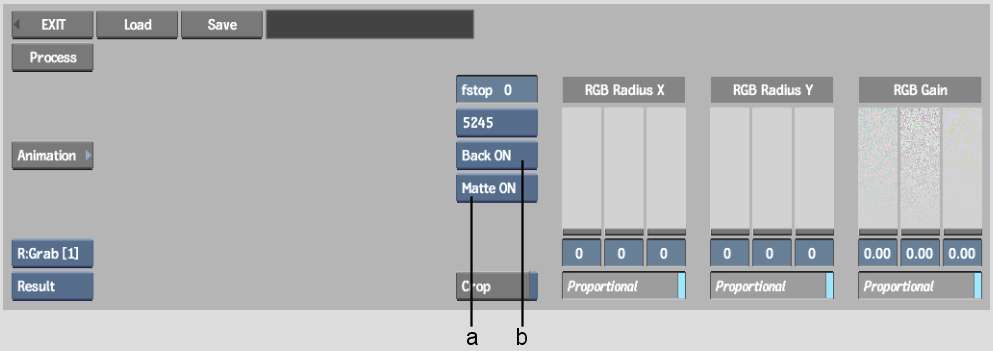If
you removed grain from a clip, for example, to perform rotoscoping,
and you want to restore the original film grain, you can do so by
analysing the grain signature of the original clip and applying
it to the retouched clip.
Another grain-matching
scenario is where you want to mix film clips that have different
grain signatures. In this case, remove the grain from one of the
clips and then analyse the grain of the other to apply it to the degrained
clip.
To match grain between
clips, you use the Front Back Matte input mode. Load the clip to
which you want to add grain as the front clip, and the clip from
which you want to analyse grain as the back clip.
When you match grain using clips on the desktop,
you must also select a matte clip. See
Adding Grain with a Matte.
If you do not want to use the matte, simply turn it off.
To access ReGrain with Front Back Matte
from the Desktop:
- From the Main menu,
click Processing, then click ReGrain.
- From the Input Mode box that appears,
select Front Back Matte, and then do the following:
- Select the clip to which you want to
add grain as the front clip.
- Select the clip from which you want to
analyse the grain signature to match as the back clip.
- If you want to add grain using a matte,
select the matte that you want to use. See
Adding Grain with a Matte.
If you do not want to use a matte, select any clip and then turn
the matte off.
The ReGrain menu appears.
- Optional: Click Reset All, and then Confirm
to reset ReGrain to the default settings.
- By default, the result clip appears.
You can also view the front, back, and matte clips by selecting
the corresponding option from the View box.
- To view the front and result clips simultaneously,
and to speed up interactivity while defining the ReGrain parameters,
use the crop box. See
Defining the DeGrain and ReGrain Area.
You are now ready to
analyse the grain in the back clip. See
Analysing the Grain in the Back Clip.
To access ReGrain with Front Back Matte
from Batch:
- Drag a ReGrain node to the Batch desktop.
- Parent the outputs for the grain matching
process:
- Parent the output to which you want to
apply grain to the front input socket.
- Parent the output from which you want
to analyse the grain signature to match to the back input socket.
- If you want to add grain using a matte,
parent the output that you want to use as the matte to the matte
input socket. If you do not want to use a matte, leave the matte
input socket empty.
- Select the ReGrain node to view its menu.
- Press Alt+3 to
select the 3-Up viewport layout.
With the upper viewport
set to display the result clip, the lower-left viewport set to display
the front clip and the lower-right viewport set to display the back
clip, you can better track your grain matching progress.
- You can also use the crop box to view
the front and results clips simultaneously, and to speed up interactivity.
See
Defining the DeGrain and ReGrain Area.
- Use the reference buffer to store intermediate
results as you set the grain removal parameters. See
Storing Reference Frames in the Reference Buffer.








